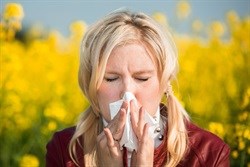This year's exceptionally wet winter season could spawn an explosion of plant and grass growth spelling trouble for hay fever sufferers this spring.

© Sandor Jackal - Fotolia.com
South Africa has experienced one of its wettest winters of late and usually after a rainy pre-season like the one we just had, followed by sufficient sunlight, there is an exponential increase of pollen in the air, which creates a perfect storm for hay fever.
A wet winter also means healthy plant roots and although we can't predict exactly how florae are going to behave, if past experience is anything to go by, grasses, trees and flowers are simply waiting for warmer and drier days to release their pollen. And when they do, it could hit very intensely.
Pollens that usually trigger seasonal allergies come from trees, grasses or weeds, but grass is by far the worst culprit in South Africa. Because of heavy winter rains, aerobiologists predict a bumper grass pollen season, which is likely to peak in October and taper off in December.
While grass species usually stagger their pollen release throughout the season, the cold weather could cause grass to release pollen earlier and more forcefully.
The most common grass species found in South Africa include winter grass, wild oats, rye grass, quaking grass, bunny tail, klokkies, Bermuda grass as well as African species such as kikuyu and buffalo grass.
Experts say it will only take a few sunny, breezy days for pollen to soar, which will soon give allergy sufferers a glimpse of what to expect for the remainder of the season.
Hay fever advice
Besides just keeping up with regular allergy medication, such as antihistamines, it is probably wise to avoid exposure and follow this advice:
- Keep doors and windows closed to avoid pollen grains from coming inside the house
- Avoid the use of fans and rather opt for air-conditioning, which can markedly cut down on the amount of pollen in a room as well as the car
- Stay indoors on high pollen days between 10am and 4pm when pollen is usually released - especially when it's windy
- Wash clothes after being outside as pollen will stick to it. Showering and washing hair after long exposure is also advisable
- Don't hang clothing outside to dry as pollen will collect on them
- If you enjoy exercising outdoors, choose the one least likely to expose you to allergens e.g. opt for tennis on a cement court rather than golf
- Wear a mask when working in the garden and mowing the lawn
It is important to pay attention to the weather. Changeable weather forecasts, which includes short periods of rain, followed by sunshine and wind, just starts it all off again and is likely to prolong the season.
Hay fever sufferers should continue taking their medication even though dispersed rain may dampen symptoms. In general, those allergic to pollen should take their medication at least two weeks prior to the start of the season which will significantly reduce symptoms such as an itchy, runny or blocked nose, irritated and watery, red eyes and/or a scratchy throat.
For up to date pollen counts, go to www.pollensa.co.za and for any hay fever related queries, go to www.allergyexpert.co.za.



































